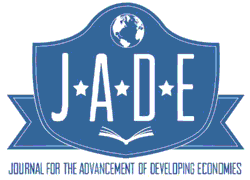Institute for the Advancement of Developing Economies

Journal for the Advancement of Developing Economies
Date of this Version
2016
Document Type
Article
Citation
Journal for the Advancement of Developing Economies Volume 5, Issue 1. 2016.
doi:10.13014/K2J67F4X
Abstract
The impact of electric energy on socio-economic development has attracted the attention of all categories of people in society. This is because of the role power plays in the economic and industrial sectors of any country. Public authorities seem to be more concerned with protecting capitalist interests at the detriment of the riparian population. Despite regulations and legal provisions, authorities are still not able to implement a rigorous policy in this sector in Cameroon due to administrative bottle necks, among other factors. Furthermore, the existence of multiple regulatory and management bodies creates confusion. Legislation related to this issue is usually not taken seriously; hence implementation in many cases does not follow an ordinary and normal procedure. In fact, it is clear that the Cameroonian consumer, and especially riparian populations around power generation sources, are not protected.
Included in
Econometrics Commons, Growth and Development Commons, International Economics Commons, Political Economy Commons, Public Economics Commons, Regional Economics Commons


Comments
Copyright 2016 JADE